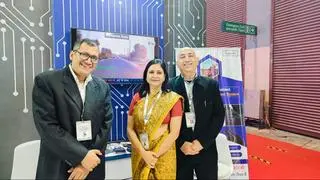While the focus of ‘smart cities’ in India is on infrastructure development outside the metros also, there are ways existing urban centres can get smarter too. Smart cities are fundamentally about convergence technologies that help with the management and delivery of an array of civic amenities and utilities within cities – from traffic to security to electricity and water. One crucial piece to this is the neighbourhood unit. Let’s think as local as apartment complexes or societies. Two Indian neighbourhood social network start-ups, Talluk and Omni, that kicked off in late 2015 are looking at how neighbourhoods can be safe and convenient.
With WhatsApp and Facebook connecting people, what distinct advantage would a neighbourhood social network bring?
“Those applications and one like Omni solve different use cases. And lots of real-world use cases are to do with what’s happening in the vicinity,” says Jackson Fernandez, co-founder, Omni.
Omni says it is in talks with various BBMP (Bruhat Bengaluru Mahanagara Palike) corporators to help them create their own discussion channels across wards, enabling citizens to notify them of concerns in the neighbourhood.
“We’ve found that corporators are receptive to this idea… there are ad hoc groups on WhatsApp, but Omni provides a more organised way for the communication to flow and be seen by all in the neighbourhood,” explains Fernandez.
He adds that discussions are on with the traffic department for enhancements on Omni. Eventually, people driving through a neighbourhood can get traffic updates in real time. A few local businesses have joined the platform and are interacting with their customers.
Since its launch, Omni’s app has seen 11,500 downloads and has 3,500 active users spread across Bengaluru’s Indiranagar and Koramangala neighbourhoods. Fernandez reveals that revenue models, while important, take second place to expanding Omni’s user base.
Revenue streamsTalluk has around 5,200 active users on its platform from across 100 ‘societies’ across the larger Delhi and NCR region. With multiple hyper-local businesses eager to advertise or be listed on the platform, Talluk is confident about diverse revenue streams, while integrating itself to civic and government bodies is part of a longer term plan.
Vishal Sharma, co-founder, Talluk says, “Over the next two years, we’ll expand across India. The moment we have access to funds we’ll try to impact Bengaluru, Mumbai and Pune. We’re hoping to attract one million users in a year.”
Sharma explains that Talluk has a social layer but also a facilities management solution. And this is the ‘smart’ piece of the model. Users are provided with vendor management services, connecting them to the local kirana or medical store.
Talluk also enables bookings of tennis court, club house, and party room within the apartment complex. However, Sharma is clear that the main problem to solve is about people talking to each other and contributing to a safe, helpful neighbourhood.








Comments
Comments have to be in English, and in full sentences. They cannot be abusive or personal. Please abide by our community guidelines for posting your comments.
We have migrated to a new commenting platform. If you are already a registered user of TheHindu Businessline and logged in, you may continue to engage with our articles. If you do not have an account please register and login to post comments. Users can access their older comments by logging into their accounts on Vuukle.